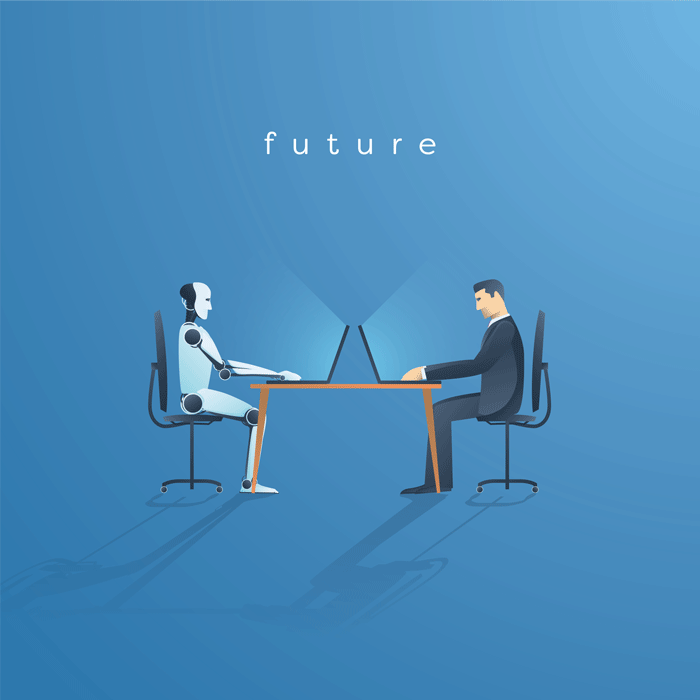Are intelligent robots poised to outsmart their human creators and become the master species of the planet? Not just yet. But as stunning progress is made in the development of artificial intelligence applications, the debate rages on over whether this technology will ultimately be seen as healthy technological advancement or bring about grave consequences.
In this article, I discuss how AI has and will continue to bring ease and efficiency to human tasks, as well as why it should be carefully controlled and deployed by the technologists developing it.
The Argument for Friend
The reasons to consider AI as a source of good are many. From farming to medical applications, data protection and everything in between, there are thousands of ways AI can help make us more efficient, healthier, and safer.
Greater Productivity
By using programmed formulas for targeted scenarios, AI can scan through massive amounts of data, thereby eliminating mundane tasks and quickly coming up with accurate solutions.
For instance, AlertBoot, a managed encryption service, logs a lot of access and user action data. However, this information is not useful unless a person goes through the data to determine the source of potential threats. To cut down on human labor hours and offer faster alerts to our clients, we are employing artificial intelligence technology to automate the process of picking up on problematic behavior. Ultimately, allows us to provide a higher level of data security to our customers.
Another example of AI improving the consumer experience comes from customer service applications. Natural language processing AI programs have been deployed by companies around the world in call centers. These automated call services eliminate a lot of frustration by gathering information about a caller’s problem and resolving it autonomously, or directing them to a representative who has been briefed in advance. In addition, as the AI application monitors calls, it can analyze data to better understand what makes customers most satisfied or most furious, and make recommendations to agents accordingly.
Humans Are Here to Stay
Proponents of “rise of the machines” dogma lament that intelligent machines are set to render human economic activities obsolete. But claims that AI will replace humans are a fable. As with past technological innovations, the nature of work will indeed continue to evolve, but the need for human labor will not disappear. Bill Gates recently pointed out that improvement in AI means we will be able to produce more with less, and will allow us to re-allocate our resources to other areas of need.
The following are some reasons the utility of humans will not be replaced:
● AI applications do not develop themselves — the need for skilled AI engineers will only continue to rise.
● AI and humans workers have worked side-by-side, with the human role becoming easier.
● Jobs in education, assisted living care, creative arts, and entertainment are not likely to be usurped by technology.
The Argument for Foe
If AI holds such great potential for business and society, why are there naysayers like Elon Musk and the late Stephen Hawking who warn that AI could “be the worst event in the history of civilization,” or “cause a third world war?”
Their concerns are not unfounded. Super intelligent systems like Google’s DeepMind are designed to think like humans, understand the world around them, and yes, perform human tasks and outsmart them. Such tech brings amazing new possibilities, but also the potential for inconceivable pitfalls.
How AI Can Get Dangerous
Like most people, I was amazed by the recent demonstration of Google Duplex at I/O 2018. It was impressive to see the AI assistant make calls to set up appointments, all without the person on the other end suspecting they were speaking to a bot. This can certainly be considered a modern day tech breakthrough, and I for one, am excited about the new supreme level of laziness this will allow me to achieve.
In all seriousness, the applications for this type of voice assistant are far and wide and could make a meaningful difference for people like busy parents or senior citizens living alone. However, I can see this tech introduce new information security risks.
For example, the type of language processing tech Google Duplex is built with could also be used to carry out phone scams, which typically prey on the elderly. This opens new potential to devious actors because scams could be carried out on a massive scale without the need to retain dozens of accomplices. Social engineering and phishing scams could also be automated and better disguised with AI. Likewise, malware could be designed with algorithms that can quickly learn how to evade network security and anti-virus software, inflicting greater damage than ever before.
With the revelations of Russian election meddling and the Cambridge Analytica – Facebook data breach scandal, many are calling for greater regulation of previously presumed trustworthy tech giants. What if truly malicious actors or enemy states are able to harness the power of artificial intelligence to steal our data, disrupt our transit systems, crash our electricity grid, or worse? These threats are alarmingly real and need to be prepared for.
Responsibility & Control For
the Win
Artificial intelligence brings immense opportunity for almost every aspect of business and society. However, it will also create new vulnerabilities in our cybersecurity systems and bring new powers to those who would do us harm.
If artificial intelligence is left to its own devices or falls into the wrong hands, no one should be surprised when robot overlords follow a fleeing human race to Mars, just as Elon Musk fears. To ensure that AI is used as a source of good, as it was intended, it is key that responsible actors guided by a (human) moral compass maintain control of the tech we create.


